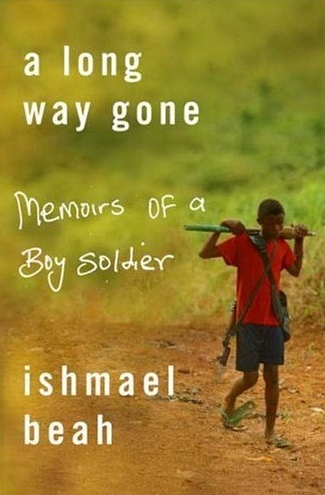
We had a bit of an action-packed day. First item on the agenda was a report-out Newsday Tuesday items. Some of the issues we talked about were: new studies about the differences in attitudes between males and female and recyclable condoms. Exciting conversation!
After this, I passed out your new books. Our next title is A Long Way Gone: Memoirs of a Boy Soldier by Ishmael Beah. This should prove to be an interesting way to look at the issue of immigration. This is a powerful story, as we found in today's reading. We only read to page fifteen, but in those few pages Ishmael's entire life changes drastically. He literally goes from being a pretty carefree child to an individual scarred by the "carnage" (a quote from one of you) of war.
Before reading, we made some predictions about what might happen in this text. We based these predictions on the activity we completed last class over recent news from Sierra Leone. You had some great predictions, including:
-women will be raped
-HIV/ AIDS may be an issue
-there will be war
-getting food and hunger will be constant issues
-the main character will see horrible things
-some people may have post-traumatic stress disorder (PTSD)
-drugs will be discussed
-child/human trafficking will be an issue
Great predictions. This shows me that you all understood your reading and that you are able to draw conclusions and make connections between the news items we read last class and the journey we're about to take. Speaking of this journey, we spoke a lot about the map in the front of the book. We remarked at how long Beah travels and that he goes in a bit of a circle. We'll have to find out more about this.
I know that I am not always accurate with my understanding of geography. When I read this book for the first time, I had to keep a map of Africa handy so that I could refer back to it. So, I printed out a map for each of you to keep out while we're reading. From now on, we'll start each class with a fact about Sierra Leone and we'll contrast this fact with one about the United States. You can keep track of the facts in the margins around your map of Africa. Today's fact came from the National Geographic site and addressed the population of each country. In Sierra Leone, there are a little more than 5.5 million people. In the United States, there are over 296 million people. (One student was able to guess how our US population fairly accurately. Good job!) The contrast in these two numbers led us to believe that Sierra Leone is probably not full of cities. We pictured it to be a more rural, isolated landscape comprised of small villages. We'll have to see if this picture holds true.
Next class, we'll continue on our journey into the life of a young Sierra Leonean, who has already been through more in fifteen pages than most people go through in an entire lifetime. Powerful stuff.